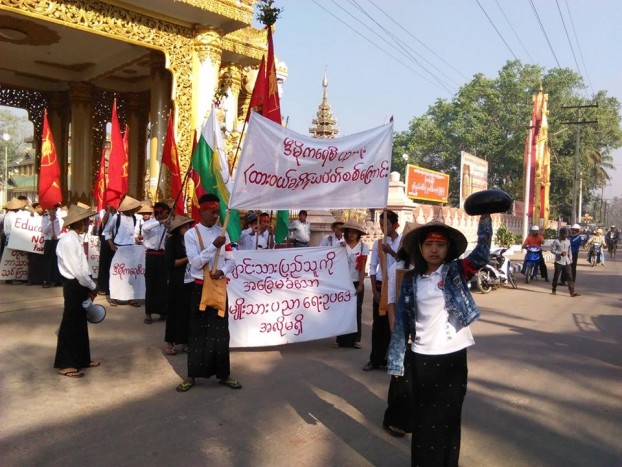Human rights defenders gathered in Rangoon yesterday to discuss the challenges of a number of provisions in the Freedom of Association Law and the current Right to Peaceful Assembly and Peaceful Procession Law.
Civil society organisations say despite the new Freedom of Association Law passed in June last year, there are still many restrictions that should be dropped.
Under the Freedom of Association Law, registration of an association is voluntary, however Nwe Zin Win, the chairman of National NGOs Network, points to the restrictions within this law.
“The registration process should be made easier, yet everyone who wants to register their association needs a recommendation letter from the government,” said Nwe Zin Win.
She said her organisation, Equality Myanmar, recently applied for a recommendation letter from the Ministry of Human Rights, but were denied, so they asked the Ministry of Home Affairs. However, they were again rejected.
She says this recommendation letter is “also related to kinship. If they didn’t know the person, they will not get the letter–this is nonsense.”
Remote civil society organisations also say that they are unsure of the benefits, whether or not they register.
Speaking to DVB after the event, Lway Cherry, secretary of Ta-ang Women Organisation (TWO) said, “We feel it is good to register, but we are afraid if we do we will receive pressure [from the government] of ‘don’t do this’ or you ‘should do this’. So it is very difficult for us to consider.”
Officials recently denied permission for a TWO report, “Trained to Torture,” to be launched at two different venues in Rangoon in June.
“We have many risks and challenges after the report [was blocked]. We didn’t even have a chance to do a launch,” said Lway Cherry. “The special branch of the military came to our office to ask about us and the key leaders of the organisations were watched–so it is very linked to freedom of expression and association.”
Although registration of organisations is voluntary, in reality discrimination reigns between registered and unregistered organisations, says Nwe Zin Win. Another barrier, she says, is the requirement that organisations must have the name of their organisation on a bank account.
“It is also a challenge for our legitimacy; if we don’t have registration, we can’t organise training or events,” she said.
The draft amendment to the Right to Peaceful Assembly and Peaceful Procession Law – which requires assemblies to give 48 hours ‘notification’ rather than requiring a group of protesters get ‘permission’ from the government – has been widely welcomed by the CSOs, but they say some of the wording of the law is problematic.
Yin Yadanar Thein from the international human rights defence organisation Article 19, says there are some limitations in the wording of the draft, particularly the wording of Section 9a: “Talking or behaving in a way to cause any disturbance or obstruction, annoyance, danger or a concern that these might take place.”
“How can they monitor whether our behaviour is a disturbance or not?” she said. “We do not know whether our words will harm or not.”
[related]
She also voiced objections to Section 9e, which states: “… saying things or behaving in a way that can harm the country of the union, race, religion, human dignity and moral principles.”
Instead, she says, this section should be in line with international standards – that as long as one doesn’t propagate violence or terrorism amongst the public, there should be freedom of expression.
She recommended that there be clear tools of protection for assemblies: “For example if there are 10 protesters, and two protesters violate the mainstream [law] then we should punish only those two people not the whole group,” she suggested.
The definition in the draft law limited to ‘citizens’ is also flawed, Yin Yadanar Thein says, as there are many non-citizens such as internally displaced people or marginalised groups in Burma.
The forum came to a close with a pledge from the National NGOs Network that they would hold another meeting soon for CSOs to learn more about how to voluntarily register their organisations.



